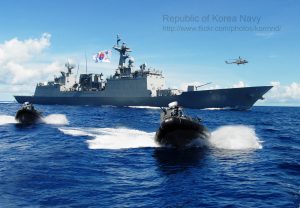The announcement by the Republic of Korea (ROK) Ministry of National Defense (MND) that it would independently deploy the Cheonghae naval unit to the Strait of Hormuz on January 21 was met with mixed reactions from the United States, the Gulf states — namely Saudi Arabia and the United Arab Emirates (UAE) – Iran, and the South Korean public. The decision came amid mounting pressures for South Korea to join the U.S.-led maritime force in the Strait of Hormuz following escalations from the Fujairah tanker attacks on May 19, 2019 and the Saudi Aramco attack on September 14, 2019 to the assassination of Iran’s Quds Force commander, Qassem Soleimani, on January 3.
Amid the tensions, U.S. President Donald Trump called on the major oil importers to increase their burden sharing by contributing their own troops to protect “their own ships” and shipping lanes.
The pressure on South Korea to share the burden of defending shipping lanes in the Middle East comes amid deadlocked negotiations on a different form of burden-sharing. While South Korea has been an ally of the United States since the Korean War, the Trump administration has demanded that Seoul massively increase its contribution to the costs of stationing U.S. troops on its soil. South Korea had agreed to pay $927 million in the last Special Measures Agreement signed in February 2019, which is a $70.3 million increase from the previous agreement. And yet, U.S. Secretary of Defense Mark Esper continued to urge South Korea to increase its financial contributions for hosting over 28,000 U.S. troops during his visit to South Korea in November 2019, further hinting at the prospects of concluding future host-nation support agreements as one-year deals rather than the usual five-year agreements.
The history of South Korea’s military contributions to the Middle East includes dispatching C-130 Hercules transport aircraft and providing medical support for the U.S.-led coalition during the Second Gulf War, deploying troops to Afghanistan in December 2001 in the aftermath of the 9/11 attacks, and participating in peacekeeping operations by deploying a Republic of Korea contingent to south Lebanon as well as the Zaytun unit to Irbil in northern Iraq and the Daiman unit to Kuwait in August 2005. In addition, Seoul has been deploying the Akh Unit special forces to the UAE since January 2011.
South Korea’s recent decision to dispatch the Republic of Korea Navy (ROKN) destroyer KDX-II and 300 naval forces is a strategic decision aimed at protecting 25,000 South Koreans in the Middle East and in ensuring the safe passage of South Korean commercial vessels. Iran’s renewed threat to close the Strait of Hormuz, a vital chokepoint for the global energy supply, in April 2019 came as a result of the U.S. maximum pressure campaign, particular the decision not to renew waivers allowing Iranian oil exports. South Korea, as the world’s fifth largest crude oil importer, has sufficient stakes to secure the passageway to the Strait, through which 70 percent of South Korea’s crude oil shipments pass. A policy adviser to the South Korean defense minister, Jung Suk-hwan, highlighted in a press conference on January 21 that South Korean vessels transit through the channel about 900 times a year.
The MND also stressed that the ROKN Cheonghae unit will not be operating as part of the U.S.-led coalition in the International Maritime Security Construct (IMSC), which is headquartered in Bahrain. The decision to operate independently from the IMSC is based on a political calculus to walk a tightrope between Washington and Tehran. Along the same lines, South Korea emphasized that its independent operations in the Strait of Hormuz will be undertaken by expanding the operations of its counterpiracy naval task force rather than dispatching fresh troops. From Seoul’s perspective this is a move to appease Tehran by detaching itself from the U.S. coalition at the same time as securing its strategic and commercial interests. According to the MND, both Washington and Tehran were informed about the decision in the weekend prior to the press release. Regardless, a spokesperson for the Iranian Ministry of Foreign Affairs, Abbas Mousavi, called South Korea’s decision unacceptable. Iran considers the presence of foreign forces in the region a threat.
By contrast, the United States and the Gulf states, particularly Saudi Arabia and the UAE, welcomed South Korea’s decision as a measure for increasing international pressure on Tehran. Pentagon spokesperson Lt. Col. Dave Eastburn commented that securing passage in the Strait of Hormuz is an “international problem that requires an international solution.”
While cautiously keeping an eye on Japan’s decision to send their naval troops and warships to the Strait on December 27, 2019, South Korea had been mulling alternative options to joining the U.S.-led coalition. Despite the rationale for “temporarily expanding the naval unit’s operational scope,” the MND’s decision sparked a debate in domestic politics, as the response was sharply polarized between the liberal and the conservative factions. Both the ruling Democratic Party and the right-wing opposition Liberty Korea Party have approved the decision whereas the progressive left-wing Justice Party and the Bareunmirae Party were opposed and demanded that the government seek parliamentary approval. The MND maintains that parliamentary approval for the move is unnecessary, citing the history of bypassing parliamentary authorizations in deploying troops for rescuing South Korean citizens from Libya and Yemen in 2011, 2014, and 2015.
As an ally to the United States and a major oil importer, South Korea is putting its national interests first by deploying a naval unit to the Strait. Nevertheless, Seoul is caught in a tug of war between the United States and Iran. Commercial, strategic, and diplomatic interests are at stake, and the debate in South Korean domestic politics reflects the dilemma of securing its national interests while trying to avoid jeopardizing commercial ties with Iran.
Hae Won Jeong is an Assistant Professor of International Relations in the Academic Programs for Military Colleges, Abu Dhabi University in Abu Dhabi, United Arab Emirates.

































